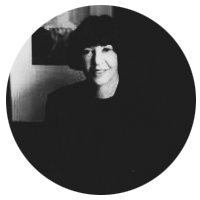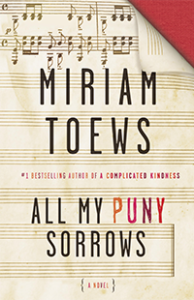Yes, it was a wretched winter.
But the polar temperatures and alpine snow piles allowed me to stay at home guilt free and chores be damned, curl up under the extra quilt and read. Besides which, some of the books I read helped me keep warm. Because they were hot. I don’t mean porno. I mean they were the kind of literary works that have some heat and sizzle. I read four such novels this winter. All four were written by women, one of them a debut novelist, the others well established in their native countries of England and Canada but little known in the U.S.—a provincialism on our part that is being rectified  by the publication here of their sparkling new works.
by the publication here of their sparkling new works.
Over four weeks, I’m introducing you to each of the books.

ALL MY PUNY SORROWS
by Miriam Toews
McSweeney’s. 317 pp.
Canadian writer Miriam Toews is another author with an inimitable dazzling voice, one in which she can write about sorrow in a way that makes you laugh, even as you feel tears surging behind your eyelids. At one point in this novel of two sisters, Yoli, the younger of the pair, reads the opening of D.H. Lawrence’s Lady Chatterly’s Lover to her depressed and suicidal older sister, Elfrieda: “Ours is essentially a tragic age,” Yoli reads, “so we refuse to take it tragically. The catclysm has happened, we are among the ruins, we start to build new little habitats, to have new little hopes. It is rather hard work: there is no smooth road into the future: but we go round, or scramble over the obstacles. We’ve got to live, no matter how many skies have fallen.” Yoli’s goal is to inspire Elfrieda to just get on with her life, to scramble over the obstacles. But the medium is the
message here. Refusing to take tragedy tragically is Toews’ modus operandi as a writer.
Elfrieda is a highly successful concert pianist. Yoli is an unsuccessful writer of bad YA novels. She is in debt, separated from her husband and two children, and has been having a lot of unsatisfying casual sexual encounters. Her latest lover, Radek, a sad-eyed Czech violinst, is “very pale with black wiry hair that covers his entire body. …I admire him for not burning it or ripping it all away like North Americans who are terrified of hair and fur in general.”

Nevertheless, it is Yoli who has been spared the family curse of depression. When the book opens, Elfrieda, who has attempted suicide several times in the past, has just swallowed a large amount of pills. Found unconscious by the girls’ mother, she has been rushed to a hospital where, unfortunately as far as Elfrieda is concerned, she has been revived. But another suicide attempt is still very much on her mind when Yoli arrives to sit by her side. “After she’d been moved from the emergency ward to the psych ward,” Yoli tells us, “They’d found her lying on the floor bleeding from her head and clutching her toothbrush in her fist the way you’d hold a paring knife if you were just about to plunge it into someone’s throat.” Elfrieda means business, and Yoli must do all she can not just to keep her sister alive, but to make her want to stay alive in the future.
Yoli wisecracks her way through her shared past with Elfrieda and their present cataclysms and somehow manages to bring her sister back from the abyss – from the kinds of sorrow we all have, and which we all must endure.
The novel is fresh and sassy, and the two sisters feel like friends you’ve always wished you knew.
FOF award-winning author, Linda Wolfe, has published eleven books and has contributed to numerous publications including New York Magazine, The New York Times, and served on the board of the National Book Critics Circle for many years.
